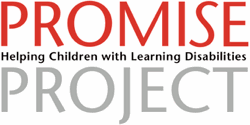The PROMISE Program
We have joined forces with Columbia University Medical Center to create the most effective and comprehensive program in New York City committed to helping underprivileged children challenged with learning disabilities.
Promise Program's knowledgeable staff of doctors uses thorough, top-quality testing methods to evaluate struggling children and pinpoint the true nature of their learning issues. Once we understand why a child is struggling in school, we make recommendations to address the child's learning issues and obtain the help they need.
At Promise the work is not complete until every child receives appropriate educational support.
Promise Program at Columbia uses a multidisciplinary approach with one-stop, comprehensive services that will enable the child to learn, excel, and reach their full potential:
The PROMISE PROGRAM clinical team employs 5 critical steps
Step 1: Identifies the exact nature of each child's learning disability
Although the Department of Education evaluates some children with learning difficulties, the evaluations frequently lack a comprehensive approach and often miss the exact nature of the problems a child is struggling with: this leads to inadequate services and/or incorrect class placement, with children often falling even further behind.
The PROMISE Program clinical team will provide detailed neuropsychological evaluations and reports that accurately identify the specific learning disabilities a child is experiencing. Testing will be customized for each child's needs. These comprehensive evaluations include teacher and parent interviews and utilize state-of-the-art testing materials to assess a wide range of learning disabilities.
Step 2: Recommends what services the child needs in order to learn
Based on the comprehensive evaluation, the clinical team will make recommendations and ensure that an accurate Individual Education Plan (IEP) is established for the child. This describes the services the child needs in order to learn and may include tutoring, after-school programs, smaller classrooms, homework strategies or special school placement.
Step 3: Helps obtain recommended services
After identifying what services the child needs to learn, the clinical team will serve as an active advocate and when needed collaborates with partner agencies who can help advocate for the child to their school and to the Department of Education. The Program will work to help families secure the services they need. Collaborative partnerships with other agencies in New York City help to insure the child will be taught in a way suitable to their learning style and maximize the impact on each child's life. When necessary, PROMISE Program will seek the assistance of pro bono legal advocates to insure that recommendations are considered and implemented.
Step 4: Guides parents on how to help the child at home and at school
No support system is more important for the long-term success of a child with serious learning disabilities than his or her family. The PROMISE Program will provide families with an understanding of the challenges their children face, culturally competent and individualized support for parents in understanding how to best support their children and parent empowering advocacy. Trained professionals will coach parents to be powerful advocates for their children and instruct them how to work with schools and help their children at home. The PROMISE Program will teach parents when and how to obtain the services available for the educational well-being of their children.
Step 5: Follows up and tracks long-term results
As children progress they may need adjustments to their educational program. As there is no cure for learning disabilities the Program will try to insure the child is still on the right path to learn. Staff will monitor short term results to make adjustments in their learning program. Children will be retested when needed (every three years) and perform long-term quantitative research to improve and develop more effective treatment for future children.
For families already burdened by other issues related to poverty, a one-stop program significantly increases the chances for success.
